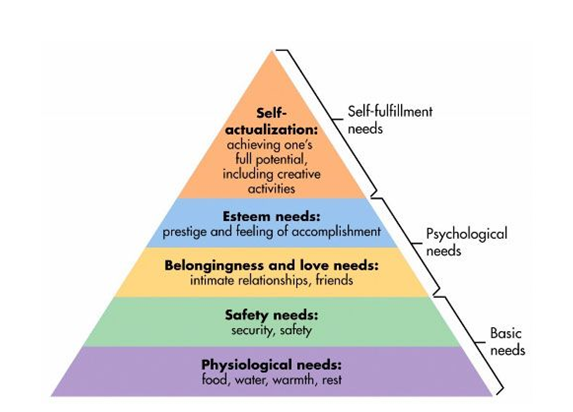AME Author, President - Speed To Excellence, www.billbakerste.com
We’ve all heard and studied Maslow’s Hierarchy of Needs that he theorized in 1943 about human motivation, but how does that relate to our present day thinking about lean transformations in the 21st Century? Let’s take look. Simplistically, he felt when humans satisfy the lowest level of need they then look to satisfy the next upper level.
 Physiological – These are the basics of human survival. Certainly having a job helps us by providing the resources to have food and shelter as well as reasonable working hours.
Physiological – These are the basics of human survival. Certainly having a job helps us by providing the resources to have food and shelter as well as reasonable working hours.
Safety – Security is a basic need provided by our community infrastructure including local first responders from law enforcement and fire departments. Also national defense forces protect us from other aggressive nations and terrorists. Safety itself is part of our organizational and personal basic culture norms. The safety systems and our own awareness of unsafe practices at work and play help protect us. We have to be alert and aware of the dangers in our surroundings every day.
Belongingness and Love – This is a two-part need that touches our Psychological needs.
- The organizational culture and people-centric leadership espoused by AME is a powerful philosophy to grow the feeling of personal value and Toyota’s “Respect for People!” Teams in the organization can also add a lot of trust and support for each other to achieve team based goals that are aligned with the organizational goals via policy deployment (Hoshin Kanri)!
- Love is between two people that find each other mutually attractive in many ways. Again, feeling a part of something and finding the one person that we value and in turn they value us personally is important for the long term.
Esteem – Esteem is the human need to achieve goals both personal and on the job. We want all workers to be able to use their brains and their hands to the best of their ability. We all know the worker doing the job knows what’s going on better than the manager. This is what a true gemba walk is all about- empowering and mentoring workers to think about continuous improvement in their daily work; to take ownership, so that when we go home at night we know if today we achieved our goals! Recognition for achievements by our peers and the organization’s management is also a big factor to fill this need.
Self-Actualization – The top of the pyramid! This is the inner personal feeling in each of us that asks the question “Am I fulfilled?” It combines answers to a couple of other questions that are all very personal and introspective.
- What is my view of my capabilities? Sometimes we have a realistic view of ourselves and sometimes we may not, but our viewpoint is “our reality.” Feedback from our peers, supervisors and direct reports in a 360 Review process may enlighten us on our strengths and opportunities from their various viewpoints. In any case, we should not ignore the feedback because what they share with us is “their reality” and molds how they work with us every day. We need to build on our strengths and work on our opportunities both!
If our organization does not employ a 360 Review process, we need to take charge and continually identify our continuous improvements needed to achieve success. Use of a mentor either unofficially or officially can help greatly!
- Am I using all my capabilities in what am I doing? After a true understanding of our capabilities and opportunities to improve and we are lucky enough to answer this question “yes” then we are in a good spot. If we feel our capabilities including using our creativity are underused then, we should ask ourselves “Are there jobs that better use my capabilities and how do I move toward them?” This plan may take the form of additional education and training, talking to our boss, securing a mentor, changing our field, or changing organizations.
As long as we have a plan to fully use our capabilities we are much more likely to achieve Maslow’s Self-Actualization level. Good luck to all of us!
Image Credit: Saul Mcleod, www.simplypsychology.org/saul-mcleod.html


